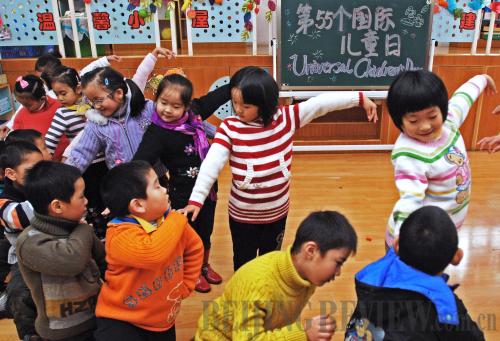|
 |
|
CHILDHOOD JOY: To throw children into classrooms too early is harmful (XINHUA) |
Upgraded Tickets
On December 10, China's railway network upgraded one-dimensional barcodes on train tickets into two-dimensional security barcodes, in hopes of reducing counterfeit tickets.
The two-dimensional barcodes can only be read by special machines while human eyes are unlikely to tell the difference. According to railway authorities, the new tickets are more difficult to counterfeit and would have no impact on passengers.
However, it's hard to say how much the upgraded tickets will protect passengers against ticket scalpers.
Train tickets are extremely hard to get around the time of the Spring Festival, the most important occasion for family unions in China. This is not just a result of the limited capacity of the railway network. In past years, despite intensive crackdowns, ticket scalpers hoarded train tickets and sold them at much higher prices than their face value.
More importantly, ticket scalpers seldom sell forged tickets. As long as they have access to the huge number of real tickets available within the railway network, no matter what anti-forgery technology is used on the tickets, it's useless.
It's more practical for the railway network to adopt a real-name system for train tickets, that is, every ticket having the passenger's name on it like plane tickets. Maybe a real-name system will not absolutely solve the ticket shortage but it will, after all, make ticket distribution fairer. Nowadays, only 15.4 percent of poll interviewees said they could book train tickets through official channels.
Changjiang Times
Costly Conferences
It's reported that the official per-capita expenditure cap for government conferences increased by up to 67 percent in 2009. The given reason said that the hike was due mainly to consumer price increases throughout the country.
According to statistics released by the National Bureau of Statistics in November, China's consumer price index fell 0.5 percent year on year, with food prices rising 1.6 percent and non-food commodity prices dropping 1.6 percent.
Maybe there were other elements we have not been informed of also contributing to the soaring expenditure cap. Relevant government agencies are obliged to explain them clearly to taxpayers. Only recently, the State Administration of Taxation announced taxpayers' rights and obligations, with the right to information being listed as a primary right of taxpayers.
Publicizing information about government operations and activities is of vital importance to clean and transparent governance. We have no well-developed system of hearings yet and taxpayers want to know detailed statistics. Otherwise, the sharply rising expenditure cap for government conferences will become another reason for the public to doubt the government's credibility.
Beijing Times
No Earlier Schooling
The Ministry of Education reportedly plans to make school admission age more flexible. As part of the reform program, it will allow primary schools to enroll students aged under 6, the country's present age of admission. While some people applaud it, this might not necessarily be a helpful revision.
Once the current six-year-old limitation is cancelled, no parents will want to send their children to school at that age while other children enter school at younger age. As a result, Chinese children will have to go to school increasingly early.
The earlier they are sent to school, the less freedom young children will enjoy. They will be thrown into endless examinations. While their heads become filled with knowledge, their simple happiness will decrease. This is harmful for their growth, especially when they are thrown in to the rigors of a curriculum before they are five years old.
In countries such as Germany and Australia, parents all hope to send their children to school at an older age when they have developed more fully physically and psychologically.
The current fixed schooling age is an effective mechanism to protect children against harm brought on by early schooling. If it is broken, Chinese children might again face a more stressful childhood.
Xinmin Evening News
Aggressive Funeral Service
Hard sell is nothing new, but for a hard sell to happen in hospital mortuaries is astonishing. Since many hospitals in Guangzhou, capital city of Guangdong Province, outsourced mortuary services, such as shrouding, to intermediaries, the intermediaries, driven by profit, have done many exasperating things. At times, when a dead person's family refused to buy their shrouds, funeral intermediary workers have dared to retain the corpse and prevent the family to move it to the funeral home.
The bottom line is: to bury the dead in dignity. Thus, a sympathetic funeral service is necessary to show respect to the dead and comfort the living. Undoubtedly, family members have the right to choose the kind of funeral service they want. It is totally a private issue, and has nothing to do with others.
Hospitals need to make money but they are not specifically profit-making institutions. Mortuaries are a supportive service hospitals should offer the dead. Outsourcing this service is clearly for profit. When even a dead person's peace is violated, how painful and helpless the living relatives must feel!
Qianjiang Evening News | 